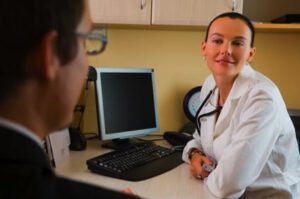
Your doctor, undoubtedly, knows quite a lot. She went through four grueling years of medical school, passed a rigorous set of board exams, and completed at least one intensive residency in her speciality.
What may surprise you, however, is that she may not know very much about pharmacogenetics, the study of how genetic variation affects drug response. Fortunately, she may recognize that this new field is quickly becoming an important part of medicine.
Perceptions of Pharmacogenetics
Felix Frueh, vice president of Medco Health Solutions and recently featured on our blog, joined together with other scientists to survey physicians across the United States on their perceptions and use of pharmacogenetic testing.
This survey, which was the first large-scale assessment of pharmacogenetic attitudes and practices in the medical community, aimed to reach physicians across a variety of ages, geographic locations, training backgrounds, and specialities. They sent nearly 400,000 surveys and approximately 3% of these surveys were returned. After finishing the analysis of these thousands of responses, Frueh and his coworkers published their findings in Clinical Pharmacology and Therapeutics last week.
A Knowledge Gap
The survey-based study simultaneously revealed both an interest in and a lack of knowledge of pharmacogenetics.
Almost every doctor who responded (97.6%) believed that genetic variation may influence drug response. This, however, stood in contrast to the small fraction of physicians (10.3%) who felt they had been adequately trained in pharmacogenetics. Fewer than one in three doctors had received any formal training in the field.
According to the survey, most doctors primarily get their information about genetic testing from coworkers, drug labels and the Internet. Not surprisingly, these doctors, many of whom felt under-trained and/or uncertain about the validity of the currently reported associations, did not use genetic testing very often.
Only about 13% said that they had ordered a genetic test for a patient in the last months; surprisingly, however, twice this number expect to order one in the next six months. This projected increase in test orders may indicate a growing appreciation for the potential benefit of pharmacogenetic testing.
An Opportunity
Although the survey results indicate that most doctors are not regularly using genetic testing, the study did give insights into which ones do.
As one might expect, doctors who received training in pharmacogenetics were about 1.6 times more likely to be early adopters of genetic testing. In addition, oncologists and surgeons (doctors in fields where pharmacogenetic testing is better established) were more likely to use genetic testing than general or family practitioners. Furthermore, doctors in private practices were more likely to be early adopters than those working in a hospital or HMO. A
ge and gender were not significantly associated with being an early adopter, although physicians who had graduated from medical school 15-29 years ago were more likely to be early adopters than those who graduated more than 30 years ago.
Reimbursement Question
The growing popularity of genetic testing among physicians raises the question of who will pay for these new diagnostics. The doctors’ almost-unanimous answer to this quandary was the health insurers. About a third of the responders felt that insurers — whether that be private, state, or federal — should provide full coverage for pharmacogenetic testing. Close to two-thirds felt insurers should provide full coverage in some situations. Indeed, approximately 9% of the doctors cited lack of insurance coverage for one of the primary reasons for not ordering tests.
Dr. Frueh and his coworkers acknowledge a potential bias in their study: the doctors who are most familiar with pharmacogenomics testing are also the doctors most likely to respond to a volunteer survey about pharmacogenomics.
The researchers, therefore, suggest that the actual percentages of doctors who received formal pharmacogenomic training and who regularly use genetic testing may be even lower than that predicted from the surveys. Their conclusions from this study, especially when viewed in light of this potential bias, underscores the need for better pharmacogenetic education in the medical community.